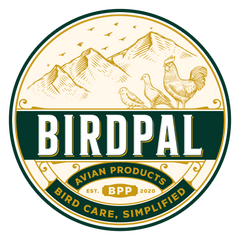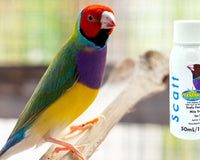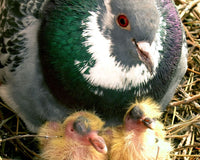"Do you have anything for canker?" is a term we often get from customers, and many times, hear their desperation in their voice when they have a serious case in their flock. Canker in birds is a deceiving and persistent condition that should not be taken lightly, however, with proper observation, preparation, and preventative measures, you can learn to live with it while minimizing the number of cases.
What is Canker, Anyway?
Canker, scientifically known as Trichomonas columbae, is a microscopic protozoan parasite that affects the bird's digestive tract, which includes the crop, throat, and other internal areas. Infection often leads to inflammation and ulceration in the upper digestive tract, which is usually in the form of the commonly-seen yellow, cheesy-like lesions in the mouth and throat.

Pictured above: a microscopic look at the canker organism, known as a trichononad. They're fast motility, which is done by their tail (Axial rod), allows them to quickly move and cross-contaminate.
Contrary to what some fanciers and enthusiasts believe, canker is not a bacteria or virus, so treating it with an antibiotic or anti-viral suppressant will not eradicate the trichononads - it'll only help with secondary infections (if they are bacterial and/or viral).
Identifying Canker and its Common Symptoms
Canker can be easily mistaken for other types of ailments which produce similar in-mouth sore which include:
- sour crop (fungal)
- wet pox (viral)
- mycotoxicosis (ingestion of toxic grains)
- capillary worms
- salivary stones
Since there are obviously many conditions that may look like canker, the only way to get a definite diagnosis is to consult with a veterinarian or by examining a sample under a microscope.
Some common physical symptoms of a bird infected with canker include:
- difficulty swallowing
- vomiting
- yellow or whitish cheesy/crusty growths in their mouth and throat
- weight loss
- difficulty breathing
- puffed feathers
- high mortality, especially in young birds/chicks
- accumulated mucus in the throat

Image above: example of canker in the mouth of a homing pigeon.

Image above: animated example of canker growth inside the mouth of a chicken. Image credit: PoultryDVM.
How is Canker Transmitted and which Birds are more Susceptible?
Canker organisms rely on the intimate relationship between it and the host so it does not survive in an outside environment for too long. It thrives on transmitting itself in saliva and crop milk so it primarily spreads via contaminated water, food, and through the parents' feeding the young. This, along with upward to 80% of pigeons already being natural carriers of canker, makes it extremely difficult to prevent and control the transmission.
Pigeons are the most susceptible but it's also a very common illness in chickens and cage birds - both showing similar symptoms. As you could imagine, young birds in the nest, and chicks, have the weakest immune systems (and are fed crop milk) so fanciers and enthusiasts mainly experience canker in their flock within this age group. They also experience a higher mortality rate since they have not fully developed. Additionally, canker during the young and old bird race seasons (pigeons) is also very common since these birds are regularly exposed to the environment, open watering sources, and other wild birds. Free-range chickens also experience higher cases of canker since they are also exposed to the environment and other wild birds.
How to Treat and Prevent
What is challenging about canker is that it can become immune to specific active ingredients, so alternating them throughout the year is advised. However, it cannot be fully controlled with only medication.
A thorough preventative treatment on all stock birds prior to breeding should be administered. When breeding, all young birds and chicks should be checked daily. Additionally, young birds and chicks should be treated with Ronidazole (which has a wide safety margin) for 3-5 days after they've weaned from the parents.
Canker flare-ups can also occur during periods of high stress such as racing, showing, transporting, and breeding. Preventative treatment (whether individual or flock) should be considered.
Unfortunately, secondary infections are also common when a bird is infected with canker, and at times are the main reason for death. Common secondary infections include:
- Salmonella
- Coccidiosis
- E.coli
- Mycoplasma (respiratory)
Common canker active ingredients in medication are:
- Metronidazole (Flagyl)
- Ronidazole
- Dimetridazole
- Secnidazole
- Carnidazole
- Acidified Copper Sulfate
Warning: the above canker active ingredients should not be used on birds whose meat or products are intended for human consumption.
Some canker treatments come in a pill form and only require you to treat for 1-2 days. This is the most effective way of treating sick birds since each one is insured their required daily dosage to properly eradicate it. However, powder treatments, which are diluted in the bird's drinking water, are the most cost-effective and convenient way of treating if you have a flock of 20 or more birds.
During severe cases, and when birds are showing signs of difficulty breathing and swallowing, removing the masses with tweezers or Q-tip is recommended.
Shop canker products for pigeons here.
Shop canker products for chickens here.
Shop canker products for cage & aviary birds here.











2 comments
Jadia L Ward
Very thorough article. Appreciate the post. The only concern is the part
“During severe cases, and when birds are showing signs of difficulty breathing and swallowing, removing the masses with tweezers or Q-tip is recommended.” Everything I have read and seen advises against this action due to a “bleed out”. I did attempt this once and the bird did bleed out. So not sure that the statement will give the best results.
Jerry Pace
Thanks for the info. I enjoyed your ressatation.